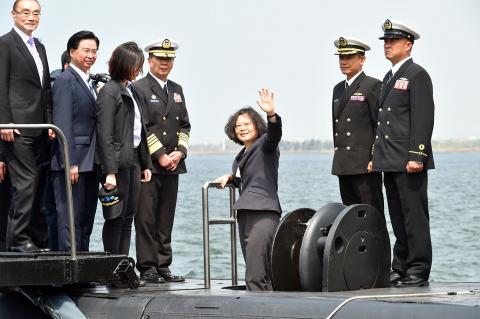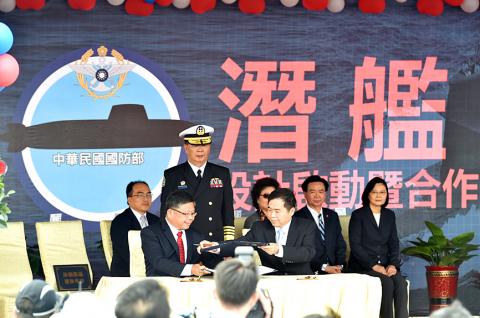The nation is hoping to build its first homegrown submarines within eight years and commission them into service within a decade, the shipbuilder tasked with carrying out the program said yesterday.
CSBC Corp, Taiwan (台灣國際造船) chairman Cheng Wen-lung (鄭文隆) said there were problems that needed to be worked out because Taiwan lacks experience in building submarines, but added that the difficulties were being addressed.
CSBC, the nation’s only listed shipbuilder, has built more than 100 ships for the navy and will use that experience in developing the local submarine program, he added.

Photo: Chang Chung-i, Taipei Times
Cheng’s comments came as CSBC and the Chungshan Institute of Science and Technology signed a memorandum of understanding (MOU) with the navy earlier yesterday in Kaohsiung to jointly build submarines for the military.
The project is part of a broader initiative to develop an independent national defense industry.
The project will have two main phases, the MOU said.

Photo: Chang Chung-i, Taipei Times
The first will be to complete the design for the submarines and will have a budget of about NT$2 billion (US$65.66 million), Cheng said.
The second stage will involve building the submarines, he said, without giving any cost projections for the vessels or estimates of how many submarines would be built.
According to the schedule, the indigenous submarines are to be completed within eight years and then commissioned into service within a decade, he said.
Cheng was asked about the planned submarines’ design and whether it would be based on the designs of existing submarines in the navy’s fleet, which were purchased from the US in the 1970s and the Netherlands in the 1980s.
“The design will be based on a model that meets the needs of Taiwan’s self-defense,” he said.
Institute vice president Gao Chung-hsing (杲中興) said that the most important part of the program is building a system that integrates all equipment and ensures the safety of ships operating underwater.
The institute will cooperate with CSBC in these areas, Gao said.
Yesterday’s signing was also witnessed by President Tsai Ing-wen (蔡英文), who said the construction of submarines is the most challenging aspect of the nation’s policy to create an independent national defense industry.
The government will exhaust all means and pool its resources to solve any problems associated with building the submarines, she said.
Minister of National Defense Feng Shih-kuan (馮世寬) also attended the signing ceremony, which was preceded by the formal send-off of a fleet of navy vessels on a training mission that will include goodwill visits to some of the nation’s diplomatic allies.
During the ceremony, Tsai boarded the Hai Lung-class submarine the Hai Hu in Zuoying Military Harbor to watch a simulation of a torpedo launch.
Taiwan has long tried to acquire submarines from other countries with little success because of their reluctance to upset China.
In 2001, then-US president George W. Bush authorized the sale of eight diesel-electric submarines to Taiwan, but the deal never came to fruition because of political wrangling in Taiwan and questions over whether the US, which did not produce conventional submarines at the time, could supply the vessels.

Right-wing political scientist Laura Fernandez on Sunday won Costa Rica’s presidential election by a landslide, after promising to crack down on rising violence linked to the cocaine trade. Fernandez’s nearest rival, economist Alvaro Ramos, conceded defeat as results showed the ruling party far exceeding the threshold of 40 percent needed to avoid a runoff. With 94 percent of polling stations counted, the political heir of outgoing Costa Rican President Rodrigo Chaves had captured 48.3 percent of the vote compared with Ramos’ 33.4 percent, the Supreme Electoral Tribunal said. As soon as the first results were announced, members of Fernandez’s Sovereign People’s Party

MORE RESPONSIBILITY: Draftees would be expected to fight alongside professional soldiers, likely requiring the transformation of some training brigades into combat units The armed forces are to start incorporating new conscripts into combined arms brigades this year to enhance combat readiness, the Executive Yuan’s latest policy report said. The new policy would affect Taiwanese men entering the military for their compulsory service, which was extended to one year under reforms by then-president Tsai Ing-wen (蔡英文) in 2022. The conscripts would be trained to operate machine guns, uncrewed aerial vehicles, anti-tank guided missile launchers and Stinger air defense systems, the report said, adding that the basic training would be lengthened to eight weeks. After basic training, conscripts would be sorted into infantry battalions that would take

GROWING AMBITIONS: The scale and tempo of the operations show that the Strait has become the core theater for China to expand its security interests, the report said Chinese military aircraft incursions around Taiwan have surged nearly 15-fold over the past five years, according to a report released yesterday by the Democratic Progressive Party’s (DPP) Department of China Affairs. Sorties in the Taiwan Strait were previously irregular, totaling 380 in 2020, but have since evolved into routine operations, the report showed. “This demonstrates that the Taiwan Strait has become both the starting point and testing ground for Beijing’s expansionist ambitions,” it said. Driven by military expansionism, China is systematically pursuing actions aimed at altering the regional “status quo,” the department said, adding that Taiwan represents the most critical link in China’s

EMERGING FIELDS: The Chinese president said that the two countries would explore cooperation in green technology, the digital economy and artificial intelligence Chinese President Xi Jinping (習近平) yesterday called for an “equal and orderly multipolar world” in the face of “unilateral bullying,” in an apparent jab at the US. Xi was speaking during talks in Beijing with Uruguayan President Yamandu Orsi, the first South American leader to visit China since US special forces captured then-Venezuelan president Nicolas Maduro last month — an operation that Beijing condemned as a violation of sovereignty. Orsi follows a slew of leaders to have visited China seeking to boost ties with the world’s second-largest economy to hedge against US President Donald Trump’s increasingly unpredictable administration. “The international situation is fraught